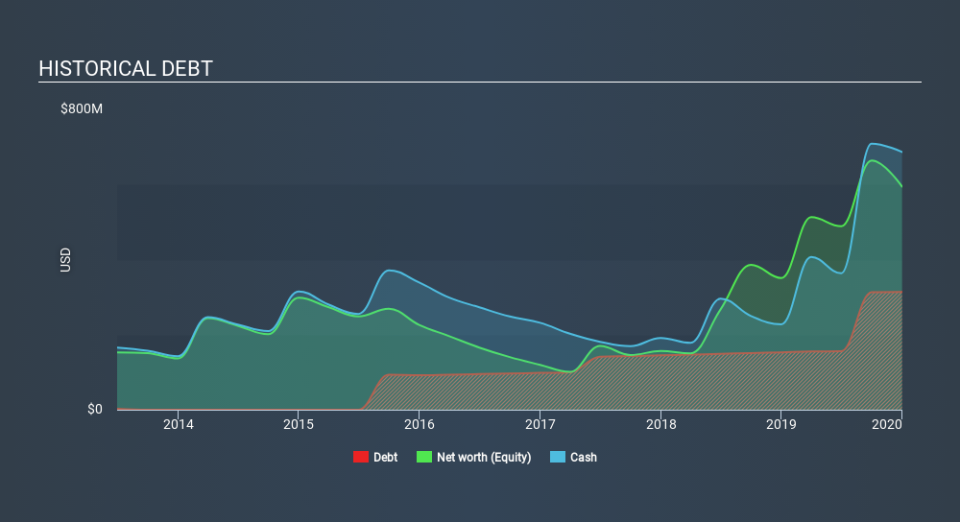Does Therapeutics (NASDAQ:PTCT) Have A Healthy Balance Sheet?

Some say volatility, rather than debt, is the best way to think about risk as an investor, but Warren Buffett famously said that 'Volatility is far from synonymous with risk'. When we think about how risky a company is, we always like to look at its use of debt, since debt overload can lead to ruin. Importantly, PTC Therapeutics, Inc. (NASDAQ:PTCT) does carry debt. But should shareholders be worried about its use of debt?
What Risk Does Debt Bring?
Debt is a tool to help businesses grow, but if a business is incapable of paying off its lenders, then it exists at their mercy. In the worst case scenario, a company can go bankrupt if it cannot pay its creditors. While that is not too common, we often do see indebted companies permanently diluting shareholders because lenders force them to raise capital at a distressed price. By replacing dilution, though, debt can be an extremely good tool for businesses that need capital to invest in growth at high rates of return. When we think about a company's use of debt, we first look at cash and debt together.
View our latest analysis for Therapeutics
How Much Debt Does Therapeutics Carry?
As you can see below, at the end of December 2019, Therapeutics had US$313.9m of debt, up from US$153.0m a year ago. Click the image for more detail. But it also has US$686.6m in cash to offset that, meaning it has US$372.7m net cash.
How Healthy Is Therapeutics's Balance Sheet?
According to the last reported balance sheet, Therapeutics had liabilities of US$235.9m due within 12 months, and liabilities of US$793.6m due beyond 12 months. On the other hand, it had cash of US$686.6m and US$55.5m worth of receivables due within a year. So its liabilities total US$287.4m more than the combination of its cash and short-term receivables.
Since publicly traded Therapeutics shares are worth a total of US$2.77b, it seems unlikely that this level of liabilities would be a major threat. But there are sufficient liabilities that we would certainly recommend shareholders continue to monitor the balance sheet, going forward. While it does have liabilities worth noting, Therapeutics also has more cash than debt, so we're pretty confident it can manage its debt safely. The balance sheet is clearly the area to focus on when you are analysing debt. But ultimately the future profitability of the business will decide if Therapeutics can strengthen its balance sheet over time. So if you want to see what the professionals think, you might find this free report on analyst profit forecasts to be interesting.
In the last year Therapeutics wasn't profitable at an EBIT level, but managed to grow its revenue by 16%, to US$307m. We usually like to see faster growth from unprofitable companies, but each to their own.
So How Risky Is Therapeutics?
We have no doubt that loss making companies are, in general, riskier than profitable ones. And the fact is that over the last twelve months Therapeutics lost money at the earnings before interest and tax (EBIT) line. Indeed, in that time it burnt through US$144m of cash and made a loss of US$252m. While this does make the company a bit risky, it's important to remember it has net cash of US$372.7m. That kitty means the company can keep spending for growth for at least two years, at current rates. Summing up, we're a little skeptical of this one, as it seems fairly risky in the absence of free cashflow. The balance sheet is clearly the area to focus on when you are analysing debt. But ultimately, every company can contain risks that exist outside of the balance sheet. Be aware that Therapeutics is showing 2 warning signs in our investment analysis , you should know about...
Of course, if you're the type of investor who prefers buying stocks without the burden of debt, then don't hesitate to discover our exclusive list of net cash growth stocks, today.
If you spot an error that warrants correction, please contact the editor at editorial-team@simplywallst.com. This article by Simply Wall St is general in nature. It does not constitute a recommendation to buy or sell any stock, and does not take account of your objectives, or your financial situation. Simply Wall St has no position in the stocks mentioned.
We aim to bring you long-term focused research analysis driven by fundamental data. Note that our analysis may not factor in the latest price-sensitive company announcements or qualitative material. Thank you for reading.



